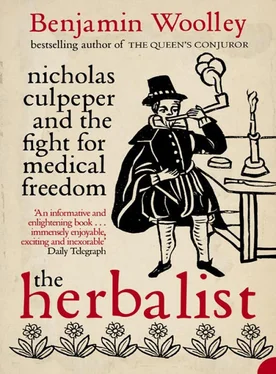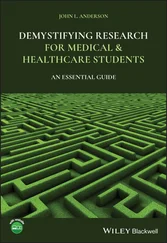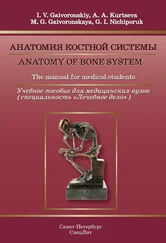England, however, was at war with Spain during the latter years of the sixteenth century, and tobacco remained a rarity. That all changed in the 1620s, when bountiful supplies of a sweet, pungent variety, superior even by Spanish standards, began to be cultivated in England’s newly-established colony of Virginia in North America, fuelling a surge in consumption.
The sudden spread of such a potent herb among the young alarmed the authorities. In the House of Commons, knights of the shires demanded that it be banned ‘for the spoiling of the Subjects’ Manners’. In his Directions for Health , first published in 1600 and one of the most popular medical books of the time, William Vaughan warned against the ‘pleasing ease and sensible deliverance’ experienced by young smokers, and, targeting his health-warning at the area that was likely to cause them greatest concern, urged them ‘to take heed how they waste the oil of their vital lamps’. ‘Repeat over these plain rhymes,’ he instructed:
Tobacco, that outlandish weed,
It spends the brain, and spoils the seed:
It dulls the sprite, it dims the fight,
It robs a woman of her right. 43
The sternest critic was King James himself. In 1604, he published his Counterblaste to Tobacco , in which he condemned the ‘manifold abuses of this vile custom of tobacco taking’. ‘With the report of a great discovery for a Conquest,’ he wrote, recalling Sir Walter Raleigh’s voyages to colonize Virginia, ‘some two or three Savage men were brought in together with this Savage custom. But the pity is, the poor wild barbarous men died, but that vile barbarous custom is yet alive, yea in fresh vigour.’
The King was particularly affronted by the medicinal powers claimed for the plant. It had been advertised as a cure for the pox, for example, but for James ‘it serves for that use but among the pocky Indian slaves’. He examined in detail its toxic effects, displaying an impressive grasp of prevailing medical theories. Following the intellectual fashion of the time, he also drew an important metaphorical conclusion about his own role in dealing with such issues: he was ‘the proper Physician of his Politic-body’ whose job was ‘to purge it of all those diseases by Medicines meet for the same’.
But even the efforts of an absolute monarch could not stop the spread of this pernicious habit. ‘Oh, the omnipotent power of tobacco!’ he fumed, consigning it to the same class of intractabilities as religious extremism: ‘If it could by the smoke thereof chase out devils … it would serve for a precious relic, both for the superstitious priests and the insolent Puritans, to call out devils withal.’ 44
His ravings had no effect on consumption. Imports of tobacco boomed: 2,300 pounds in 1615, 20,000 in 1619, 40,000 in 1620, 55,000 in 1621, two million pounds a year by 1640. 45The more popular it became, the more James found that even he could not do without it. ‘It is not unknown what dislike We have ever had of the use of Tobacco, as tending to a general and new corruption, both of men’s bodies and manners,’ the King announced in a proclamation of 1619; nevertheless, he considered ‘it is … more tolerable, that the same should be imported amongst many other vanities and superfluities’ because, without it, ‘it doth manifestly tend to the diminution of our Customs’. 46In other words, the health risks of smoking were less important than his need for money.
James’s fiscal needs were certainly pressing. Since the reign of Elizabeth, finance had been a source of growing tension between the monarchy, Parliament, and members of the upper and ‘middling’ classes of society rich enough to pay taxes. Under England’s often anomalous constitutional arrangements, the King, though an absolute monarch, had to summon a Parliament – representing the nobility and the bishops in the House of Lords, mostly the landowning, professional, and merchant classes in the Commons – if he wanted to raise taxes. James had several sources of private revenue, such as rents and fines, but their value had eroded during a period of escalating inflation. 47Thus he was forced on several occasions to summon Parliament and haggle over his income, a process that tended to force some of the extravagances and corruptions of his court humiliatingly into the light. His response was to look for more private ways of raising money that did not require parliamentary consent. He borrowed heavily from the City of London, a ready source of money but provided, as events later showed, with strings. He started selling titles. He invented the lower rank of ‘baronet’, aimed at members of the gentry such as Sir Edward Culpeper, which offered the prestige of nobility without the prerogatives. He exploited feudal privileges such as ‘wardships’, a royal right to the income from estates inherited by under-age heirs. However, his most lucrative source of revenue was customs duties. These were notionally under the control of Parliament but, following a convention established in the reign of Edward IV, were granted to James for the duration of his reign. Taking advantage of the concession, he supplemented the income they generated with special duties or ‘impositions’ levied on particular goods. A test case brought in 1606 by a merchant who refused to pay the imposition on a hundredweight of currants affirmed that James was entitled to the money, on the grounds that the royal prerogative was ‘absolute’. The custom duty due on tobacco was 2 d . per pound weight in 1604. James initially increased it more than fortyfold by adding an impost of 6s. 10 d. a pound, a rate so punitive it proved unenforceable and had to be reduced. Exploiting another controversial privilege, he then granted a patent for control of the entire tobacco trade to a court favourite, who in return for the right to ‘farm’ the duties was expected to pay up to £15,000 a year into the royal exchequer. Later still, he allowed for the practice of ‘garbling’, imposing an obligation on merchants to have their goods checked and sealed by an official. It was claimed such a measure was needed to prevent the sale of bad or adulterated tobacco, but in practice it was used to increase revenue, as the officials began to charge a further 4 d. per pound for passing each bale of tobacco. Such prescriptions set the tone not only of James’s fiscal policy, but also that of his heir, Charles I – a purgative applied by these physicians of the ‘Politic-body’ that would result in the most dreadful convulsions.
As well as being embroiled in such political controversies, tobacco was associated with intellectual ones as well. Critics disapprovingly noted that the herb carried the endorsement of philosophers such as Giambattista della Porta. Della Porta’s Natural Magick (first published in Latin in 1558 as Magiae naturalis ) was one of a series of notorious sixteenth-century works that contained combustible mixes of herbalism, medicine, religion, magic, alchemy, and astrology. Such works had inspired a flowering of interest in magic in England, and particularly at Cambridge University, encouraged by Queen Elizabeth’s magus Dr John Dee (who had noted the properties of tobacco in his copy of Monardes’ herbal) and reflected in works such as Spenser’s Faerie Queene and Shakespeare’s The Tempest. In later years, tobacco also became associated with religious fanaticism. A sect called the Ranters thought that, since predestination meant that your fate in the next life was fixed, you may as well make the most of this one, and so smoking (along with drinking, feasting, and whoring) became elevated to a sacrament. Even the more sober Baptists were partial to a smoke during their services. 48
Thus, a pipe of tobacco in the early seventeenth century took the smoker on a heady botanical, political, and philosophical, as well as recreational, trip. This made it all the more appealing to a young Cambridge undergraduate with a curious mind and a full pocket. It was also the reason why the university authorities tried to ban smoking. They failed, or even had the reverse effect, and Nicholas was one among many who enjoyed flouting the prohibition.
Читать дальше












